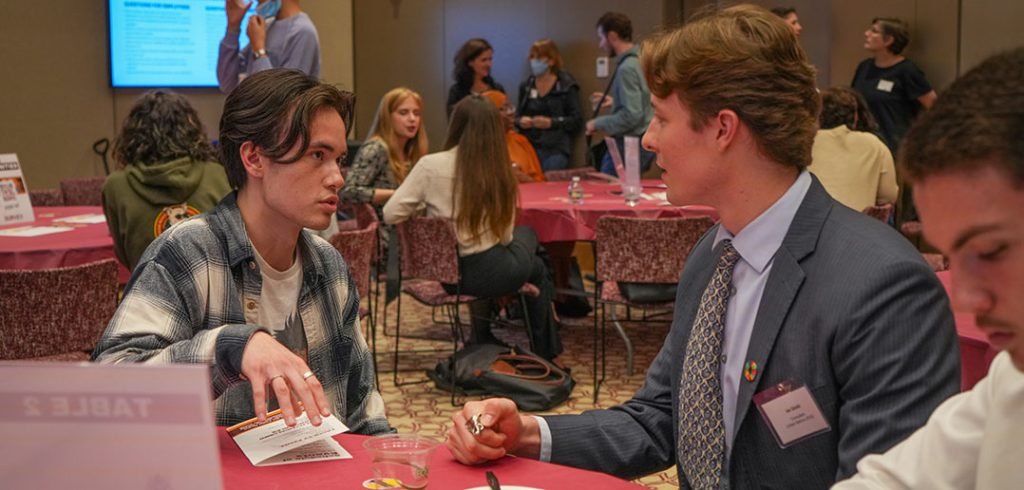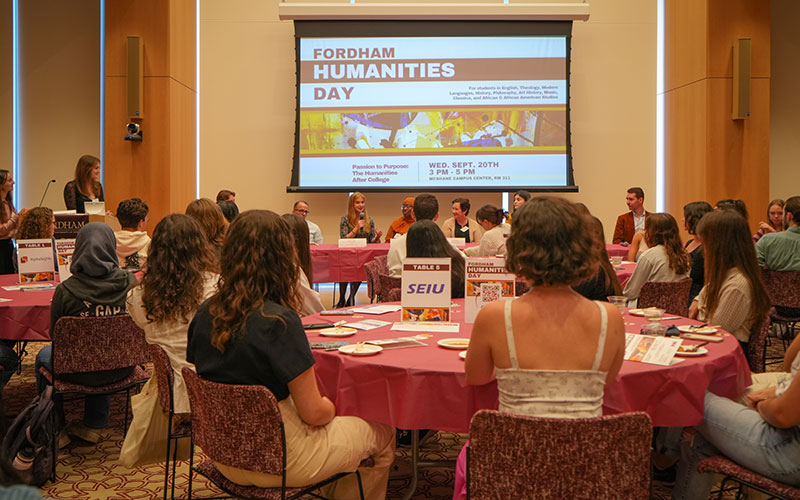“We all know that today, the humanities are under siege in virtually every university in this country,” Brenna Moore, Ph.D., theology professor, said at Fordham’s first-ever Humanities Day event on Sept. 19. “The logic seems to be we need a stripped down, efficient society, and education is about making workers competitive in our economy. Today we gather to push back on this pernicious logic.”
Moore is part of a group of faculty members that formed the Fordham Humanities Consortium, which aims to “help our students flourish as they choose majors that seem increasingly countercultural.” The group organized the Humanities Day gathering, in partnership with Fordham’s Career Center, drawing more than 100 students to hear from alumni and faculty about the importance of a humanities degree and potential future paths.
Putting Lessons into Action
Kacie Candela, FCRH ’19, is now a trial attorney for the U.S. Department of Justice, where she utilizes skills she learned as an English and international political economy major.
“I was able to take advantage of working with a professor so closely that by the time I got to law school, I didn’t need that close direction—I knew how to write a 60-page academic article because I had already done it,” she said.
Ian Smith, FCLC ’22, who majored in international studies and is a consultant for the United Nations, said that he took advantage of the resources at Fordham to land his current job.
“I got this job only because I did an internship at this agency, and the reason I got this internship was because I did research in Kenya over the summer when I was going into senior year, and the only reason I got to do that was because I got a grant from the dean’s office,” he said.
Finding Your Purpose
Tyesha Maddox, Ph.D., assistant professor of African and African American Studies, said that her own journey to becoming a historian of the African diaspora, with a focus on the Caribbean, was inspired by her family’s connections to the region. For Maddox, who started her academic journey with a bachelor’s in history and Africana Studies from Cornell University, the key was finding how her personal journey intersects with the needs of the broader world.
“The hard thing to do in life is to find a way to connect your purpose with your passion, and to do something that fulfills you and that you feel brings meaning to the world,” she said.
For Justin Foley, FCRH ’95, GABELLI ’03, his undergraduate experience showed him how to think creatively and be open to new paths, which is how he went from working as a tenant organizer to deciding to pursue an M.B.A. to becoming a program organizer for the Service Employees International Union.
Foley said his undergraduate degree in the humanities gave him the skills to navigate his not-quite-linear career path.
“Nobody said, ‘Here’s what your career track is going to be,’” said Foley, who double majored in urban studies and philosophy. “I really learned to indulge my curiosity about the world around me … My undergrad time has given me a framework for my values.”
Taking Advice
Aidan Graham, a junior at Fordham College at Rose Hill, said that he saw similarities between himself and Candela, as he is also majoring in international political economy—and philosophy—with plans to go into law as well. But he appreciated hearing from successful alumni who said their first path was not necessarily the only path.
“I found it comforting because a lot of the panelists said that the uncertainty that comes with studying humanities and not knowing your exact career path is common,” he said. “It’s like a sense of community.”
Additional reporting by Kelly Prinz.


